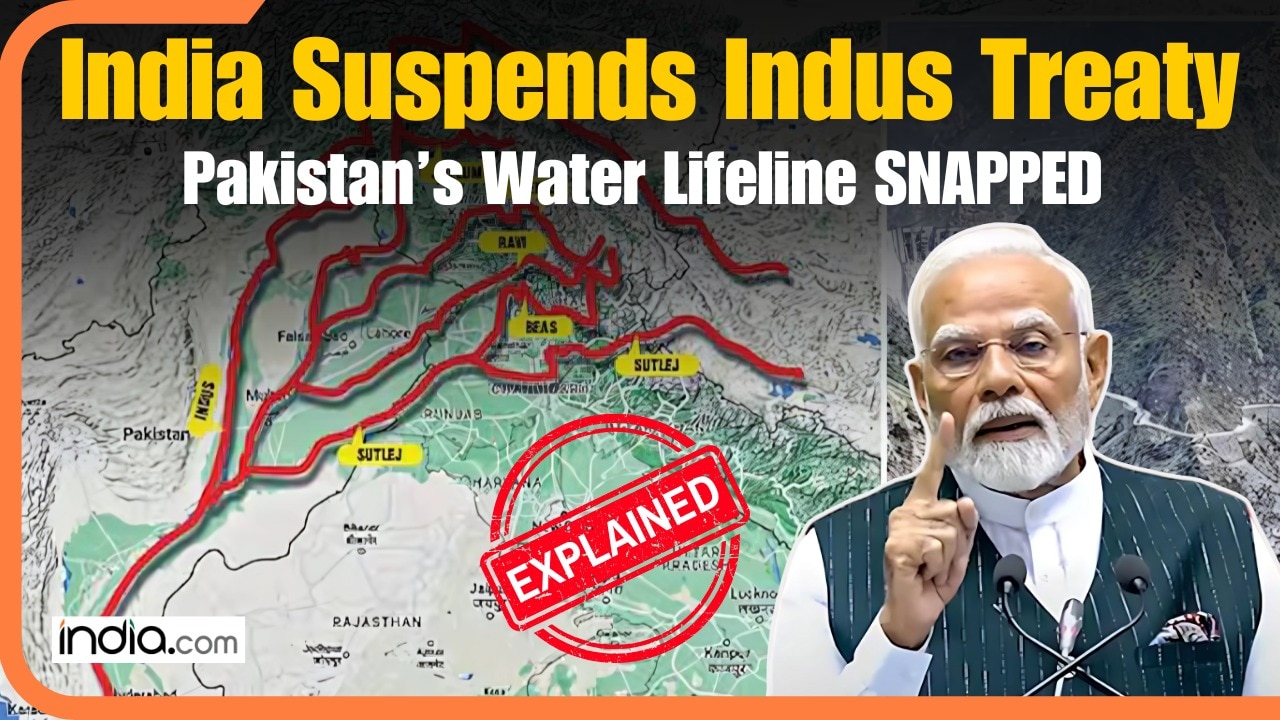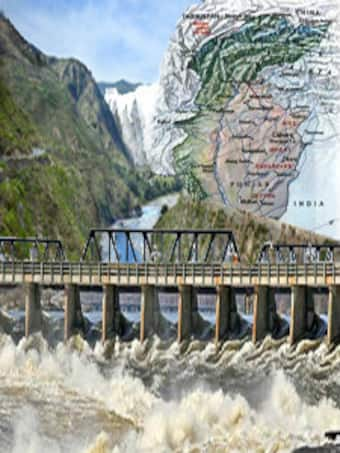
Indus Waters Treaty Suspended | What It Means for Pakistan?
|
|

The Indus Waters Treaty is a treaty of water distribution between India and Pakistan. The treaty is brokered by the World Bank. On September 19, 1960, the Indus Water treaty was signed in Karachi. The treaty was signed by the then Prime Minister of India Jawaharlal Nehru and the then President of Pakistan Ayub Khan. As per the treaty, the control over the rivers the Ravi, the Beas, and the Sutlej was granted to India. On the other hand, the control over the rivers the Indus, the Chenab, and the Jhelum was given to Pakistan. In addition to that, the provisions were made on how the waters will be shared. The rivers from Pakistan flow through India and India would use the water for transport, irrigation and generation of power. The treaty was a consequence of the fear of Pakistan that, since the sources of rivers of the Indus basin were in India, it could potentially generate famines and droughts in Pakistan, mainly at times of war. After the approval of the Indus Waters Treaty in the year 1960, Pakistan and India did not engage in any water wars. Many disputes that cropped up related to water was resolved through legal procedures. At present, the Indus Waters Treaty is considered as a successful water sharing accomplishments in the world. According to the provisions of the treaty, India can utilize its 20% share of the Indus river water.
Indus basin water begins in the Himalayan Mountains and Tibet and in some states of Himachal Pradesh and Jammu and Kashmir. The water flows from the hills through Himachal Pradesh, Punjab, Jammu and Kashmir and Sindh. It joins in Pakistan and empties in the Arabian Sea. Initially, there was a narrow stretch of irrigated lands alongside the rivers, later due to various developments; many canals and storage facilities were built in order to provide water for over 26 million acres (110,000 km2). A disagreement was created due to the partition of British India over the Indus basin waters. During the initial years of partition, Indus waters were shared out by the Inter-Dominion agreement of May 4, 1948. As per the treaty, India has to share sufficient amount of water to the regions of Pakistan. In return, annual payments were to be given from the Pakistan government. The agreement was done to meet the requirements and negotiations for a better solution. On the other hand, both Indian and Pakistan were unwilling to compromise their positions and negotiations reached an impasse.
From the Indian viewpoint, Pakistan cannot do anything to prevent India from any scheme to redirect the water flow in the rivers. The Pakistan nation wanted to take the concern to the International Court of Justice. However, India refused. They further argued that the conflict required a bilateral decree. The Indus water treaty hasn’t taken into consideration the Indian state of Gujarat as the part of Indus river basin. The Indus River enters the region of the Great Rann of Kutch and feeds in to Kori Creek at times of flood. During the Indus Waters Treaty in the year 1960, the region of Great Rann of Kutch was a disputed territory between the two nations. Later, it settled in the year 1968. The settlement was made by sharing the total disputed area in the ratio of 9:1 ratio between India and Pakistan.
Without India’s consent, Pakistan started the construction of Left Bank Outfall Drain (LBOD) project which passed through the region of the Great Rann of Kutch with the assistance from the World Bank. The purpose of Left Bank Outfall Drain (LBOD) is to sidestep the polluted and saline water which is not healthy for the use in agriculture to reach sea via the area of the Great Rann of Kutch without passing through its Indus delta. The Left Bank Outfall Drain (LBOD) release water that enhances the flooding in India. It also contaminates the quality of water bodies which are the source of water to the salt farms. The Left Bank Outfall Drain (LBOD) is intended to join the sea through disputed Sir Creek but the water of Left Bank Outfall Drain (LBOD) is entering the territory of India due to many breaches. In the year 2016, due to the consequences of the Uri attack, India reviewed the Indus Waters treaty and its provisions. Several changes have been recommended. The treaty is declared invalid as it was signed by the Prime minister of India. The Prime Minister is not the head of the republic of India. The official head of the state is the President.
The Indus Waters agreement set up the Permanent Indus Commission to arbitrate any further disputes cropping up over the share of waters. The Permanent Indus Commission has survived 3 wars. It offers ongoing machinery for discussion and conflict resolution through inspection, visits and exchange of data. The Permanent Indus Commission is required to meet frequently in order to carry out discussions pertaining to potential disputes and cooperative arrangements for the basin’s development. Either India or Pakistan must inform the plans to build any engineering works which would influence the other party and to provide data about such works. At the time of disagreement, a neutral expert settles through arbitration and mediation. Neither India nor Pakistan has initiated projects that could cause the kind of disagreement that the Commission was created to decide, the exchange of data and annual inspections persist, tranquil by tensions on the subcontinent.
Nivedita Dash May 1, 2025 6:42 AM IST
The Indian airspace will not be available for the aircraft registered in Pakistan as well as for planes operated, owned or leased by Pakistan airlines and operators.
Analiza Pathak April 29, 2025 2:38 PM IST
Pakistan, whose economy relies heavily on agriculture, 85 per cent of which is sustained by the Indus river system has reacted strongly, calling India's move "an act of war."
Nivedita Dash April 26, 2025 11:18 AM IST
India's decision to suspend the decades-old treaty follows the killing of 26 people, mostly tourists, in a terror attack in Jammu and Kashmir's Pahalgam on Tuesday.
Analiza Pathak April 25, 2025 9:50 AM IST
According to media reports, India is also considering stopping all future meetings with Pakistan related to the IWT. This includes regular discussions and updates that are part of the treaty framework.
Suparna Shree April 24, 2025 6:45 PM IST
Indus Waters Treaty Suspended | What It Means for Pakistan? Explained For the first time in over six decades, India has suspended the Indus Waters Treaty a landmark water-sharing agreement with Pakistan that survived wars, terror attacks, and political upheaval. This treaty, signed in 1960 and brokered by the World Bank, gave Pakistan access to the vital western rivers, Indus, Jhelum, and Chenab, which make up nearly 80% of its water supply. India's move to suspend the treaty sends shockwaves through the region. But why now? And what are the consequences for both countries?
Girish Linganna April 24, 2025 11:51 AM IST
India's decision to pause the Indus Waters Treaty is a bold, emotional response to the Pahalgam tragedy. It shows that India is done tolerating attacks linked to Pakistan.
India.com News Desk January 27, 2023 1:58 PM IST
Under the notice, India has called on Pakistan to enter into intergovernmental negotiations within 90 days to "rectify the material breach" of the treaty and also "update the treaty to incorporate the lessons learned over the last 62 years"
PTI Feeds September 16, 2017 2:40 PM IST
Indo-Pak talks on Indus Waters Treaty fail to break deadlock
PTI Feeds September 16, 2017 2:17 PM IST
No agreement reached at Indus Waters Treaty talks: World Bank
Indo-Asian News Service January 20, 2017 4:39 PM IST
Technical details of all the upcoming projects should be shared along with their designs and locations so that Islamabad could examine them in a manner they did not create problems every now and then and the treaty could function smoothly, said Ausaf.
ANI January 4, 2017 9:00 AM IST
"We're in regular communication with the Indian and Pakistani governments on a wide range of issues," he said. Pakistan had earlier sought support of the United States on the implementation of the IWT with India.
ANI December 31, 2016 11:40 AM IST
Dar said that the Indus Waters Treaty is an international commitment and it is the responsibility of the World Bank to make sure that India honours this treaty and the water rights of hundreds of millions of people of Pakistan are protected.
ANI December 30, 2016 9:15 AM IST
He pointed out, "There is an arbitration mechanism to resolve the dispute regarding implementation of the treaty. We resolved many IWT disputes amicably in the past."
Sandhya Dangwal December 24, 2016 2:05 PM IST
During the meeting, India stressed its focus to bringing Punjab and Jammu & Kashmir to speed up work on the ground through better co-ordination.
Press Trust of India December 2, 2016 11:54 AM IST
Zakaria said the treaty was a binding agreement under the Vienna Convention. India has been, since the escalation of tensions after the Uri militant attack, indicating its intention to revisit the accord.
ANI September 27, 2016 7:25 PM IST
In the meeting, New Delhi ruled out cancelling the Indus Waters Treaty (1960) but said that it is looking for ways of increasing its use of waters that flow from India but are controlled by Pakistan.
India.com News Desk September 26, 2016 4:52 PM IST
The Indus basin is host to six rivers, which are categorized as Eastern rivers and Western rivers. While the former comprises of Satluj, Beas and Ravi, the latter includes Indus, Jhelum and Chenab.
Indo-Asian News Service September 24, 2016 10:25 AM IST
The Indus Waters Treaty is a water-sharing arrangement signed by then Indian Prime Minister Jawaharlal Nehru and then President of Pakistan Ayub Khan.
India.com News Desk September 24, 2016 12:53 AM IST
The Indus Waters Treaty succeeded in surviving throughout the war-torn history of India and Pakistan. By abrogating it, Modi regime would give birth to another conflict.
Enroll for our free updates
